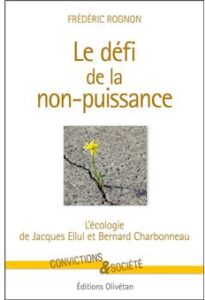Read: The challenge of non-power according to Ellul and Charbonneau
 David and Jonathan, Augustine and Alypius, J.R.R. Tolkien and C.S. Lewis… how can one not be fascinated by these friendships that have inspired so many beautiful things? The friendship between Jacques Ellul and Bernard Charbonneau also bore fruit far beyond the private sphere.[1]
David and Jonathan, Augustine and Alypius, J.R.R. Tolkien and C.S. Lewis… how can one not be fascinated by these friendships that have inspired so many beautiful things? The friendship between Jacques Ellul and Bernard Charbonneau also bore fruit far beyond the private sphere.[1]
Born in 1910 and 1912 respectively, Ellul and Charbonneau grew up in the Bordeaux region and met on the benches of the lycée. Ellul converted to Christianity at the age of 17, while Charbonneau remained an agnostic all his life.
Frédéric Rognon, a recognised specialist in Jacques Ellul, explores the intellectual and militant commitments of these two friends who “devoted their lives to analysing the changes in our societies, assessing the signs of the times, outlining possible future developments, and engaging in decisive battles.”
The subjects covered are diverse: the search for efficiency at all costs, the sense of limits, the idolatry of the car, food, conditions of animals. “Marginalised during their lifetime, if not ostracised by the French intellectual sphere, which could not hear their cries of alarm, they were rediscovered at the dawn of the 21st century, when it was realised that their predictions proved (alas!) to be completely true.”[2]
Ellul and Charbonneau developed an original way of thinking about major societal issues, while remaining anchored in a territory. Both were active in the protection of the Atlantic coastline.
For A Rocha too, whether through work in our centres or through the development of local groups, this attachment to the local is a key value, and this book really gives us food for thought. It also invites us to reflect on the links between commitment and friendship. Ellul and Charbonneau have each stimulated and enriched the thinking of the other, and this over several decades. Are we capable of cultivating such lifelong friendships? Or are we in such a hurry, so caught up in the heat of the moment, that our commitments tend to distort our relationships rather than strengthen them?
Ellul may have found a key: “Freedom in Christ consists in considering each of our works (political, economic, technical…) as useless, provisional and relative. This does not mean withdrawing from the world, but living fully in the world without idolising our works.”[3]
[1] Frédéric Rognon, Le défi de la non-puissance : L’écologie de Jacques Ellul et Bernard Charbonnier, Collection Convictions et Société, Lyon, éditions Olivétan, 2020, p. 10.
[2] Ibid., p. 11.
[3] Ibid., p. 149
